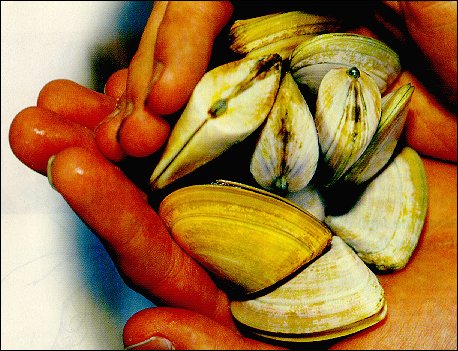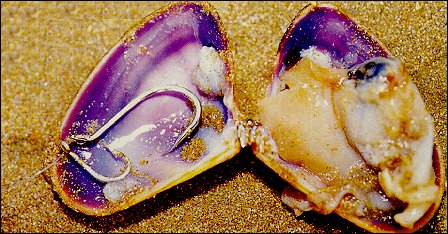The Humble Cockle
Cockles are very common, and are distributed on surf beaches from southern Queensland to the Eyre Peninsula in great old SA. Although they are only found in the surf, they are also good bait for some fish that are caught off the rocks. A bait of cockles will take drummer, bream, flathead, whiting and trevally.

They are also an excellent berley for beach anglers who can break them open and throw them into the surf as they fish. Doing this sometimes can really bring any nearby fish onto the bite. A dozen broken cockles should be plenty for this.
Cockles like high-energy sandy beaches that are long and gently sloping. They jump out of the sand and put their "foot" out to catch a wave down the beach before reburying. They take about a second to bury themselves, using their foot to pull themselves in. They cant do it in dry sand. The water helps them to shift the sand. A classic example of this is Goolwa Beach, where the surf and waves pound an ever sloping beach.

Because cockles need water to bury themselves, it is important to put those you don't intend to keep, back into the surf. Cockles left on dry sand will die. They can be found buried in the sand where the high tide has been, usually 6 to 10 cm below the surface. At low tide, they may be seen burrowing into the sand in the wash zone, or just as lumps on the surface in drier sand.
Cockles along the high water tide mark will often give you a good indication that they are around. Often you'll find them by moving your feet in the sand as the waves rush past.
Cockles eat microscopic plants, (phytoplankton) that live in the surf. They grow to a maximum size of 80 mm after three and a half years. Growth varies according to season and age, and most cockles range between 30 and 50 mm, living for four or five years. They seem to become sexually active at about 32 mm and there are equal numbers of male and female. When mature cockles spawn, their larvae go out into the currents and 4 to 6 weeks before spat, they return to the beach to settle.
 Fishing Tip : Fishing Tip : |
|
| Why not contact fishSA.com about your Fishing Tip |
|
|